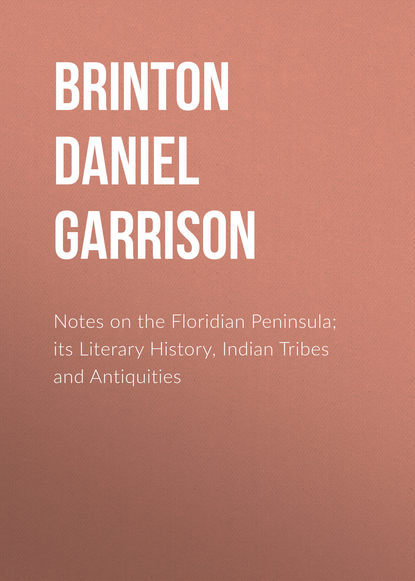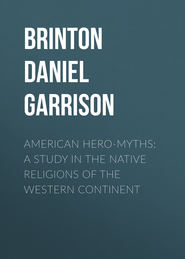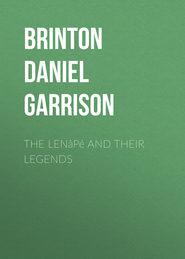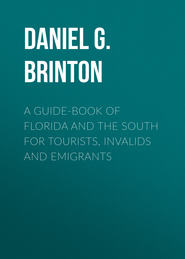По всем вопросам обращайтесь на: info@litportal.ru
(©) 2003-2024.
✖
Notes on the Floridian Peninsula; its Literary History, Indian Tribes and Antiquities
Автор
Год написания книги
2018
Настройки чтения
Размер шрифта
Высота строк
Поля
168
Hist. N. Am. Inds., p. 116.
169
Nat. Hist. of E. and W. Florida, pp. 71, 83.
170
Mems. Hist. sur la Louisiane, Tome II., p. 301.
171
George White, Hist. Colls. of Georgia, p. 423. It has also been described to me by a gentleman resident in the vicinity.
172
See the Christian Advocate and Journal for 1832, and the almost unintelligible abstract of the article in Josiah Priest’s American Antiquities, pp. 169, 170, (third edition, Albany, 1833.) Though the account is undoubtedly exaggerated, it would merit further investigation.
173
See Appendix II.
174
I give these according to the orthography of Baumgarten, who may differ slightly from other writers.
175
Oratio Dominica Polyglotta, Amstelædami, 1715. He does not state where he obtained them.
176
Hewitt, History of South Carolina, Vol. I. p 156.
177
El Cacique principal de Apalache, Superior de muchos Caciques, Barcia, Ensay. Cron., p. 323.
178
Roberts, Hist. of Florida, p. 14.
179
Schoolcraft’s Ind. Tribes, Vol. V. p. 259.
180
Schermerhorn, Report on the Western Indians in Mass. Hist. Colls. Vol. II. (2 ser.,) p. 26; Alcedo, Hist. and Geog. Dict. of America, Vol. I., p. 82.
181
Views of Louisiana, p. 150.
182
Trovarono terre grandi piene di genti molto ben disposte, savie, politiche, e ben’ ordinate. Bartolome de las Casas, Istoria della Distruttione dell’ Indie Occidentali, p. 108. Venetia, 1626.
183
Barcia, Ensay. Cron., p. 71.
184
Memoire, p. 13.
185
At what time or by whom Tampa Bay was first so called I have not been able to learn. Its usual name in early narratives is Baia de Espiritu Santo, which was given by De Soto; sometimes from separate discoveries it was called Bahia Honda (Deep Bay,) El Lago de San Bernardo, Baie de St. Louis, and by the Indiana Culata (Barcia, Ensayo Cron. p. 342, Torquemada, Monarquia Indiana, Lib. I., Cap. VI.) Herrera in his map of the Audiencia de la Española marks it “B. de tampa,” and after him Gerard a Schaagen in the Nov. et Accurat. Americæ Descriptio.
186
Williams, Hist. of Florida, pp. 36, 212. Ellicott’s Journal, p. 247. Robert’s Hist. of Florida, p. 17.
187
Guaicum officinale; the el palo or el palo santo of the Spaniards.
188
Barcia, En. Cron. Año 1566.
189
See Prior’s Journal in Williams’ Florida, p. 299. The name Miami applied to a tribe in Ohio, and still retained by two rivers in that State, properly Omaumeg, is said to be a pure Algic word, meaning, People who live on the peninsula. (Amer. Hist. Mag. Vol. III., p. 90.) We are, however, not yet prepared to accept this explanation as applicable to the word as it appears in Florida.
190
Barcia, Ensay. Cron., p. 49, and compare the Hist. Notable, p. 134.
191
For these facts see Fontanedo’s Memoire, passim, and Barcia, Años 1566, 1567.
192
Bernard Romans, pp. 291-2.
Hist. N. Am. Inds., p. 116.
169
Nat. Hist. of E. and W. Florida, pp. 71, 83.
170
Mems. Hist. sur la Louisiane, Tome II., p. 301.
171
George White, Hist. Colls. of Georgia, p. 423. It has also been described to me by a gentleman resident in the vicinity.
172
See the Christian Advocate and Journal for 1832, and the almost unintelligible abstract of the article in Josiah Priest’s American Antiquities, pp. 169, 170, (third edition, Albany, 1833.) Though the account is undoubtedly exaggerated, it would merit further investigation.
173
See Appendix II.
174
I give these according to the orthography of Baumgarten, who may differ slightly from other writers.
175
Oratio Dominica Polyglotta, Amstelædami, 1715. He does not state where he obtained them.
176
Hewitt, History of South Carolina, Vol. I. p 156.
177
El Cacique principal de Apalache, Superior de muchos Caciques, Barcia, Ensay. Cron., p. 323.
178
Roberts, Hist. of Florida, p. 14.
179
Schoolcraft’s Ind. Tribes, Vol. V. p. 259.
180
Schermerhorn, Report on the Western Indians in Mass. Hist. Colls. Vol. II. (2 ser.,) p. 26; Alcedo, Hist. and Geog. Dict. of America, Vol. I., p. 82.
181
Views of Louisiana, p. 150.
182
Trovarono terre grandi piene di genti molto ben disposte, savie, politiche, e ben’ ordinate. Bartolome de las Casas, Istoria della Distruttione dell’ Indie Occidentali, p. 108. Venetia, 1626.
183
Barcia, Ensay. Cron., p. 71.
184
Memoire, p. 13.
185
At what time or by whom Tampa Bay was first so called I have not been able to learn. Its usual name in early narratives is Baia de Espiritu Santo, which was given by De Soto; sometimes from separate discoveries it was called Bahia Honda (Deep Bay,) El Lago de San Bernardo, Baie de St. Louis, and by the Indiana Culata (Barcia, Ensayo Cron. p. 342, Torquemada, Monarquia Indiana, Lib. I., Cap. VI.) Herrera in his map of the Audiencia de la Española marks it “B. de tampa,” and after him Gerard a Schaagen in the Nov. et Accurat. Americæ Descriptio.
186
Williams, Hist. of Florida, pp. 36, 212. Ellicott’s Journal, p. 247. Robert’s Hist. of Florida, p. 17.
187
Guaicum officinale; the el palo or el palo santo of the Spaniards.
188
Barcia, En. Cron. Año 1566.
189
See Prior’s Journal in Williams’ Florida, p. 299. The name Miami applied to a tribe in Ohio, and still retained by two rivers in that State, properly Omaumeg, is said to be a pure Algic word, meaning, People who live on the peninsula. (Amer. Hist. Mag. Vol. III., p. 90.) We are, however, not yet prepared to accept this explanation as applicable to the word as it appears in Florida.
190
Barcia, Ensay. Cron., p. 49, and compare the Hist. Notable, p. 134.
191
For these facts see Fontanedo’s Memoire, passim, and Barcia, Años 1566, 1567.
192
Bernard Romans, pp. 291-2.











